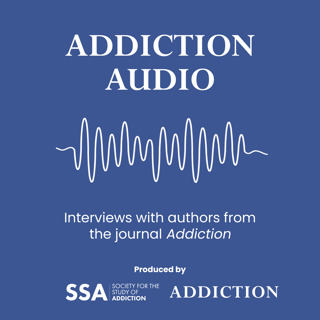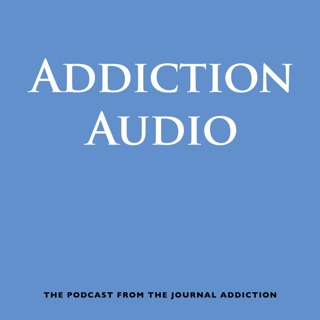
Social media and alcohol with Brandon Cheng
Dr Elle Wadsworth talks here to Brandon Cheng about his research on social media posting and drinking behaviour. Brandon talks about the influence that media and social media have on young people and how they can influence their drinking behaviour.“A young person watching a short video of people enjoying drinks [is] likely to develop a much more vivid imagery of what drinking can be like … compared to a viewer just to see an image or text relating to someone having a good time drinking.”Original article: A systematic review and meta-analysis of the relationship between youth drinking, self-posting of alcohol use and other social media engagement (2012 – 2021) by Brandon Cheng and colleagues. Published in Addiction (2023). Hosted on Acast. See acast.com/privacy for more information.
26 Syys 202317min

Cannabis, sport and anti-doping regulations with Tom Hudzik
In this episode Dr Rob Calder talks to Dr Thomas Hudzik about his work with the World Anti Doping Agency (WADA). Tom talks about the three principles by which a substance is assessed and how they use the latest research and policy changes to make decisions about whether a substance is banned and how it is detected. They specifically cover the decision to implement and in-competition ban cannabis and the basis on which that decision was made."The substance use can represent a risk to the athlete's health them-self or the health of those around them.... somebody who is allowed to perform in a group type of situation, their judgement will be impaired most likely. And that may affect the score that you have, but it could also mean that you do something silly physically that you might not have done otherwise because your reaction time is slow, your temporal estimation capabilities are slow." Original article: Cannabis and sport: A World Anti-Doping perspective by Thomas Hudzik and colleagues. Published in Addiction (2023) Hosted on Acast. See acast.com/privacy for more information.
21 Syys 202323min

Fentanyl, poly-substance use and the US opioid epidemic with Joseph Friedman
Ben Scher talks to Dr Joseph Friedman about his research on fentanyl overdoses. Joseph explains the four waves of opioid overdoses in the US and how opiate and opioid overdoses have changed.They discuss how patterns of poly-substance use are different across the US and how the combination of fentanyl and methamphetamines is become more prevalent across states. Along with the challenges of standardising results when coroners’ reports vary across the US.One of the main takeaways here is just understanding that poly-substance drug overdose is really becoming the norm….The percent of US overdose deaths involving both fentanyl and stimulants in 2010 was 0.6% so one in every 200 overdose deaths and by 2021 it rose to one-third of all [overdose] deaths.Original article: Charting the Fourth Wave: Geographic, Temporal, Race/Ethnicity, and Demographic Trends in Polysubstance Fentanyl Overdose Deaths in the United States, 2010-2021 by Joseph Friedman and colleagues. Published in Addiction (2023) Hosted on Acast. See acast.com/privacy for more information.
13 Syys 202315min

Vaping and smoking cessation with Vassilis Sideropoulos
Rob Calder talks to Vassilis Sideropoulos about a recent paper on the role of vaping products in smoking cessation. The first author for this paper was Dr Catherine Kimber.Vassilis talks about the array of components that can contribute to quitting smoking when using vaping products. He summarises the research team’s work on identifying which combinations of support types are most effective. He talks about their research into advice on vaping products, nicotine strength and e-liquid flavours, as well as providing information on the relative harms of vaping and smoking and text message support.There's so many different flavours right now you can pick up almost anything now..... it's a massive raise and I think that's why flavour is a component that we need to understand better.Vassilis also talks about the challenges of recruiting participants from social media and how to exclude bots from your research participant group.Original article: E-cigarette support for smoking cessation: Identifying the effectiveness of intervention components in an on-line randomized optimization experiment by Catherine Kimber and colleagues. Published in Addiction (2023) Hosted on Acast. See acast.com/privacy for more information.
24 Elo 202324min

Overdose risk, opioid agonists and other medications with Eleni Domzaridou
Rob Calder talks to Dr Eleni Domzaridou about her recent article on the risk of overdose among people prescribe medication for opioid use at the same time as being prescribed other medication - such as for mental health disorders.People who use opioid drugs are often prescribed drugs for physical or mental health problems or for pain management. Eleni and the research team studied non-fatal overdoses among this group of people. In this podcast, Eleni outlines why the marker of non-fatal overdose is important when seeking to prevent fatal overdoses. Eleni also talks about the challenges and practicalities of using a large data-set with data from GP surgeries to draw conclusions about associations between prescribed drug use and overdoses.There is an elevated non-fatal overdose risk for patients prescribed opioid agonists concurrently with benzodiazepines, gabapentinoids, z-drugs or antipsychotics.Original article: Non-fatal overdose risk associated with prescribing opioid agonists concurrently with other medication: cohort study conducted using linked primary care, secondary care, and mortality records by Eleni Domzaridou and colleagues. Published in Addiction (2023) Hosted on Acast. See acast.com/privacy for more information.
17 Elo 202318min

Methamphetamine, psychosis and family history with Rebecca McKetin
In this episode Ben Scher talks to Dr Rebecca McKetin about her recent article looking the relationship between psychosis, psychotic symptoms and methamphetamine use. They discuss the implications and talk about who exactly is at risk of methamphetamine-related psychosis. Along the way, they cover the background of methamphetamine use in Australia and how this varies from country to country.They then discuss the relative risk for psychotic symptoms among people with and without a family history of psychosis. The risk also changes when people are (or are not) actively using methamphetamine. Rebecca also talks about the potential for people to progress to schizophrenia and how treatment services should respond. Rebecca talks about the range of interventions that could be used to address methamphetamine related risks use and drug-related mental health problems.We need to target methamphetamine use as a risk factor for psychosis, regardless of whether people have a history of psychosis on their family.... the other one is that we need to be looking at people who do have a family history of psychosis at being at very high risk of having psychotic symptoms.Original article: How does a family history of psychosis influence the risk of methamphetamine-related psychotic symptoms: Evidence from longitudinal panel data by Rebecca McKetin and colleagues. Published in Addiction (2023) Hosted on Acast. See acast.com/privacy for more information.
10 Elo 202318min

Hallucinogen use, young adults and monitoring the future with Katherine Keyes
In this episode, Dr Elle Wadsworth talks to Dr Katherine Keyes about her study examining changes to hallucinogen use among young adults in the US. Katherine also talks about using the Monitoring The Future survey to identify patterns of substance use among young adults."...going from 2020 to 2021 we really saw substantial increases in the prevalence of young adults who are reporting that they use hallucinogens other than LSD. And we didn't see the same trend of use of LSD."Original article: Hallucinogen use among young adults ages 19–30 in the United States: Changes from 2018 to 2021 by Katherine M. Keyes and colleagues. Published in Addiction (2023) Hosted on Acast. See acast.com/privacy for more information.
3 Elo 202323min

Perspectives on gambling from 1561 with Louise Nadeau
In this episode Ben Scher talks to Professor Louise Nadeau about her recent article anaysing the content of a Latin-language treatise on gambling addiction written nearly 500 years ago. Ben and Louise discuss the medical model of gambling and issues of historic identification. They unpick how the original authors wrote about the medical model of addiction long before it was called that. Parts of the treatise refer to non-problematic gambling - noting that there was a small population who had problems. There are also references to gambling harms and models of treatment that go back to the 6th century AD. This podcast offers a fascinating historical insight in a way that illuminates our current understanding of addiction and co-occurring disorders."So here was this person in 1561 who was thinking of erroneous cognitions who thought of genetic vulnerability - all that at the end of the Renaissance."Original article: A re-discovered treatise from 1561 by Louise Nadeau and Marc Valleur. Published in Addiction (2023) Hosted on Acast. See acast.com/privacy for more information.
28 Heinä 202323min



















